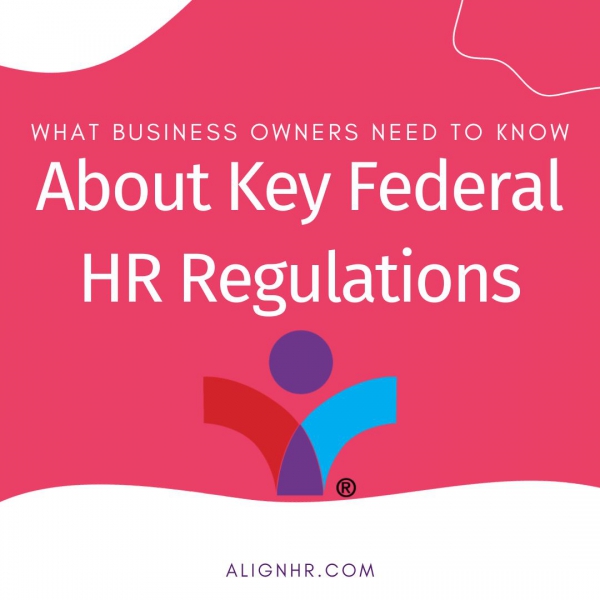
Navigating the complex landscape of federal regulations is a critical responsibility for small business owners. Understanding and complying with these regulations is not only essential for legal compliance but also for fostering a positive work environment and avoiding costly penalties. In this blog post, we will provide valuable insights into some key HR federal regulations that impact small businesses. By staying informed and seeking expert guidance, you can ensure compliance and protect your business's best interests.
The Fair Labor Standards Act sets guidelines for minimum wage, overtime pay, and child labor standards. It is crucial for small business owners to understand the FLSA provisions, such as determining exempt vs. non-exempt employees, tracking hours worked, and calculating overtime compensation. Compliance with the FLSA helps protect both employees and employers, ensuring fair treatment and avoiding legal disputes.
The Family and Medical Leave Act provides eligible employees with unpaid leave for qualified family and medical reasons. Small business owners should familiarize themselves with the FMLA regulations, including employee eligibility, leave duration, and documentation requirements. Adhering to the FMLA guidelines promotes a supportive workplace culture and safeguards the rights of employees facing personal or family health-related challenges.
The Americans with Disabilities Act (ADA) is a federal law that prohibits discrimination against individuals with disabilities. It applies to many small businesses and ensures equal access to goods, services, employment, and facilities. For small businesses, compliance with the ADA is crucial as it helps create an inclusive environment, broadens customer reach, and avoids legal consequences for non-compliance, such as fines and lawsuits. It promotes fairness and accessibility, benefiting both businesses and the disabled community.
OSHA regulations focus on workplace safety and health standards. Small business owners must assess potential hazards, implement safety protocols, and provide appropriate training to employees. Understanding OSHA requirements can help prevent accidents, maintain a safe working environment, and avoid penalties resulting from non-compliance. Prioritizing workplace safety fosters employee well-being and reduces the risk of legal liabilities.
EEO laws prohibit workplace discrimination based on protected characteristics such as race, color, religion, sex, national origin, disability, sexual orientation, and age. Small business owners should be aware of these laws and ensure fair and equitable treatment throughout the employment lifecycle, including recruitment, hiring, promotion, and termination. Complying with EEO laws fosters diversity and inclusion, creating a positive work environment that attracts and retains top talent.
The Affordable Care Act mandates certain healthcare provisions for businesses with a specific number of employees. Small business owners should understand their obligations under the ACA, including providing healthcare coverage, reporting requirements, and compliance with the employer shared responsibility provisions. Staying informed about ACA regulations ensures compliance and helps manage healthcare-related costs effectively.
Immigration laws govern the employment of foreign workers and require employers to verify the eligibility of employees to work in the United States. Small business owners should understand their responsibilities regarding employment eligibility verification (Form I-9) and stay up to date with any changes in immigration regulations. Adhering to immigration laws ensures compliance and avoids penalties associated with unauthorized employment.
Small business owners must comply with various tax regulations, including federal income tax, payroll tax, and employment tax requirements. Understanding payroll related tax obligations, reporting deadlines, and maintaining accurate records is crucial to avoid legal and financial repercussions. Consulting with a tax professional or Payroll team/HR consultant can provide guidance in navigating the intricacies of tax regulations.
Complying with federal regulations is essential for small business owners to protect their businesses, foster a positive work environment, and avoid legal liabilities and risk. By understanding key regulations such as the Fair Labor Standards Act, Family and Medical Leave Act, Occupational Safety and Health Administration requirements, Equal Employment Opportunity laws, Affordable Care Act provisions, immigration laws, and tax regulations, you can ensure compliance and create a strong foundation for your business.
At AlignHR, we understand the challenges faced by small business owners in navigating federal regulations. Our experienced HR consultants can provide guidance and support to ensure compliance and optimize your HR processes.
Contact us today to learn more about how AlignHR can assist you in understanding and complying with federal regulations. Our tailored solutions are designed to help you protect your business, foster a compliant work environment, and focus on what you do best. Don't let federal regulations become a burden – let AlignHR be your trusted partner in HR compliance and success. Reach out to us now to take the first step towards regulatory peace of mind.